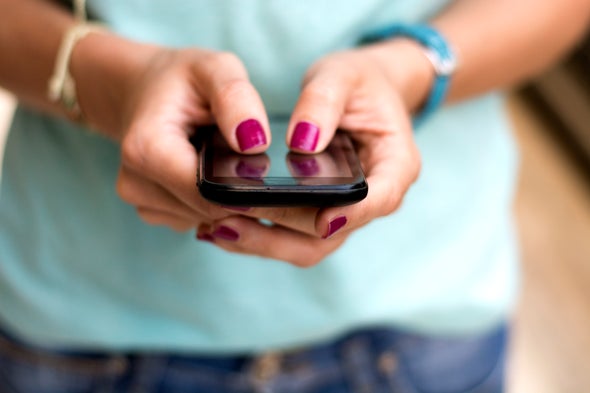(单词翻译:单击)
听力文本
This is Scientific American's 60-second Science, I'm Jared Rizzi.
Kids spend a lot of time looking at screens. And some parents worry. But a new study argues against the apprehension parents may feel.
"The danger is that they're hearing a message that social media, digital technology use is causing very serious and harmful problems like depression, like suicide-related behaviors."
Candice Odgers, professor of psychological science at the University of California, Irvine.
"And the idea is that if you shut off social media, which lots of kids use to connect with each other, their friends, find out information about health, you could in fact be making a situation worse. Parents are really being sent a message that is not supported by anything scientifically."
Odgers and her colleagues looked at the screen-related behavior of 400 public-school students in North Carolina ages 10 to 14. This group was picked as a representative sample of race and socioeconomic status for the entire U.S. The researchers found that—even not counting time doing schoolwork on screens—the kids spent between almost five hours to seven hours per day on their devices, with the older kids online the most. That's a lot of hours, but:
"Overall, what we find is no connection between the amount of time that young people spend online using digital technologies and mental health symptoms like depression, anxiety. When we do find associations, they were actually quite surprising to us. We found that young people who sent more text messages actually reported better mental health. Now, again, this was a small association, but it reflects what other people have found: that people who are very connected off-line, that use technology in the positive ways to stay connected often, are more connected online as well and experiencing better mental health."
The new study is in the journal Clinical Psychological Science.

So why the fears about screen time? Odgers argues that the methodologies for older studies may have led to false conclusions.
"One of the issues with the research that's been done to date has been that youth are, you know, in school. They have a survey put in front of them, and they're asked to recall, over the past six months, 'How often are you online?' and 'Have you ever felt depressed?' And the correlation between those two things has been used to spread a lot of fear around this connection between social media use and things like depression—99.5 percent of the reasons that kids differ in their depression is due to something other than the time they spend online."
Parents get a lot of advice, and some of it always seems to conflict. But Odgers suggests there's one place you can always go to get information.
"The hope is that more parents will hear this message and relax and spend kind of less time worrying about smartphones and more time just talking to their kids."
Thanks for listening for Scientific American — 60-Second Science. I'm Jared Rizzi.
参考译文
这里是科学美国人——60秒科学系列,我是贾里德·里吉。
孩子们长时间盯着屏幕看。这令一些家长感到担心。但一项新研究反驳了家长们的忧虑。
“危险在于,他们听到的消息是:社交媒体、数字技术使用引发了非常严重而且有害的问题,比如抑郁症以及自杀相关行为。”
加州大学欧文分校的心理学教授坎迪斯·奥格斯说到。
“我们的观点是,如果关闭许多孩子用来与朋友彼此联系以及查找健康信息的社交媒体,那事实上会让情况变得更糟。家长收到的信息并没有科学支持。”
奥格斯和同事研究了北卡罗来纳州公立学校中400名10岁到14岁学生的屏幕相关行为。这个年龄组被选为整个美国种族和社会经济地位的代表性样本。研究人员发现,即使不算使用屏幕做作业的时间,孩子们每天使用电子设备的时间也在5到7个小时之间,年龄较大的孩子上网时间更多。这是相当长的时间,但是:
“总的来说,我们发现年轻人上网使用数字技术的时间与抑郁症、焦虑症等心理健康症状之间没有联系。当我们真的发现二者之间有联系时,这些联系令我们相当惊讶。我们发现,发信息多的年轻人实际上心理健康状况更好。重申一下,这是一种小关联,但这反映了其他人的发现:在线下联系密切且以积极方式使用技术保持联系的人,往往在线上的联系也更为密切,而且心理健康状况也更好。”
这项新研究发表在《临床心理科学》期刊上。
那为什么要担心屏幕时间呢?奥格斯认为,此前的研究可能导致了错误的结论:
“到目前为止,所研究的一个议题是,学校里的年轻人。在他们面前放一份调查问卷,让他们回忆过去6个月‘多长时间上一次网’以及‘是否曾感到抑郁’。二者之间的关联被用来广泛传播这种恐惧:社交媒体使用与抑郁症等疾病有关——导致孩子患上抑郁症的原因各不相同,但其中99.5%是上网时间以外的因素。”
家长会收到很多建议,但其中一些似乎总是矛盾的。但奥格斯认为,有一个地方你总能获得信息:
“希望更多的父母能听到这条信息,然后放松下来,少花点时间担心智能手机,多花点时间和自已的孩子交流。”
谢谢大家收听科学美国人——60秒科学。我是贾里德·里吉。
译文为可可英语翻译,未经授权请勿转载!
重点讲解
重点讲解:
1. argue against 反对;
The report argues against tax increases.
报告提出理由反对提高税率。
2. shut off 关闭;关上;使停止运转;
Stopping to rest, Pete shut off the flash.
皮特关掉手电筒,停下来休息。
3. to date 迄今;到目前为止;
To date there is no evidence to support this theory.
到目前为止,还没有证据支持这种理论。
4. other than (用于否定陈述后)除了…以外;
There are similar charges if you want to cash a cheque at a branch other than your own.
如果你想在开户行以外的网点兑现支票,也要收取类似的费用。


